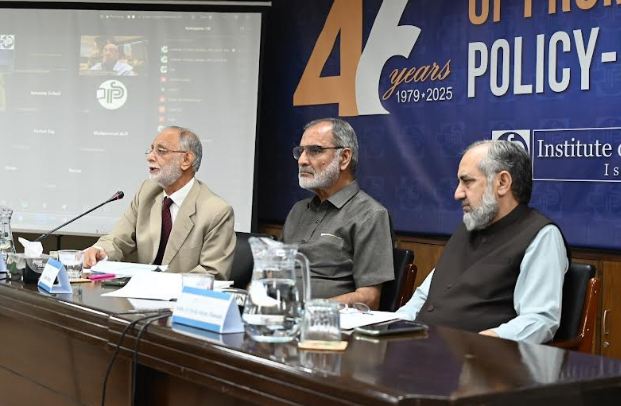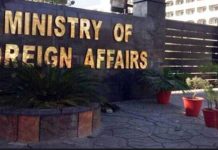ISLAMABAD, MAY 28 /DNA/ – In an era where public policy research in Pakistan remains largely underprioritized and often influenced by vested interests, donor agendas, and politically driven narratives, the presence of independent research institutions is a necessity. In this context, for 46 years, IPS has sustained its mission of offering principled, non-partisan, and value-driven research rooted in national priorities and ethical clarity amidst a rapidly evolving policy landscape.
This was commemorated during a session at the Institute of Policy Studies (IPS), Islamabad, marking its 46th anniversary with a reflective and forward-looking direction. The event aimed to reflect on the vision of the Institute’s late founder and patron-in-chief, Prof Khurshid Ahmad, IPS’ contributions over the years and lay out its future direction in terms of public policy research.
The event was addressed by Khalid Rahman, chairman IPS, Amb (r) Syed Abrar Hussain, vice chairman IPS, Dr Waqar Masood Khan, former federal secretary, finance, Prof Dr Anis Ahmad, founding vice chancellor Riphah International University, Prof Dr Ijaz Shafi Gilani, founder Gallup Pakistan, Bashir Janmohammad, chairman Westbury Group of Companies, and Ameena Sohail, energy lawyer. Other IPS associates also joined the session.
Speakers highlighted the Institute’s enduring role in bridging policy, research, and stakeholders through research, dialogue, and publications since its founding in May 1979.
Participants reflected on the state of public policy thinking in Pakistan, noting that the environment is increasingly shaped by fast-paced global changes, post-truth narratives, and a growing emphasis on research quantity over quality. They warned that such trends risk compromising long-term national interests unless institutions like IPS continue to provide a platform for value-based, evidence-driven, and contextually grounded policy discourse in a pragmatic manner.
Speakers underscored that despite these mounting challenges, they also open space for opportunity, especially for research organizations that maintain intellectual independence, narrative clarity, and strategic foresight. IPS was recognized as a model for such institutions, having sustained a credible and continuous contribution to national discourse for nearly five decades.
Khalid Rahman emphasized that IPS’ journey reflects not only institutional perseverance but also a deep sense of responsibility toward shaping the nation’s intellectual and policy landscape amidst challenges. He reiterated the Institute’s commitment to continuing its work as a research-intensive platform and sustaining its mission with consistency, intellectual rigor, and relevance across changing political and social contexts.
Looking ahead, Rahman called for greater support for independent policy research institutions, emphasizing the importance of platforms capable of producing purposeful ideas, nurturing critical discourse, and fostering long-term policy thinking free from short-term political or commercial interests.
Ambassador Abrar Hussain elaborated on IPS’ vision, which is firmly rooted in Prof Khurshid Ahmad’s concept of intellectual self-reliance, ethical scholarship, and public service. He emphasized the need to carry this legacy forward with renewed commitment in light of today’s complex governance and research challenges.
The event also featured a presentation showcasing the IPS’ journey, highlighting major milestones, thematic evolution, recent notable publications, and the expanding engagement with a cross-section of society at national and international levels.

















